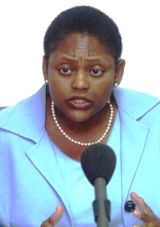US pursuing “activist diplomacy” in Sudan – official
Nov 2, 2005 (WASHINGTON) — Assistant Secretary of State for African Affairs Jendayi Frazer’s approach to building peace in Sudan is an active, practical one involving day-to-day contact between members of Sudan’s new government of national unity and top U.S. officials like Vice President Cheney, as well as frequent travel to the region.
 The idea, she told a House Subcommittee on Africa hearing looking into the crisis in Sudan November 1, is “to maintain momentum on implementation of the Comprehensive Peace Agreement [CPA] and resolve the crisis in Darfur” through a policy of “activist diplomacy” by senior members of the U.S. government.
The idea, she told a House Subcommittee on Africa hearing looking into the crisis in Sudan November 1, is “to maintain momentum on implementation of the Comprehensive Peace Agreement [CPA] and resolve the crisis in Darfur” through a policy of “activist diplomacy” by senior members of the U.S. government.
“President Bush was the first head of state to speak out publicly on the unfolding violence and atrocities in Darfur in 2004,” Frazer reminded the panel, adding that the United States was “the first country to call for action in the United Nations Security Council,” as well as later providing $160 million to help fund an African Union (AU) peacekeeping mission to Darfur.
That said, Frazer told the House panel: “The United States is on the right track and our strategy is moving forward. We believe we have the tools in place to maintain momentum and influence the parties” to make the CPA work and to negotiate an end to the conflict in Darfur.
Frazer, a former Harvard University professor who served as national security adviser for Africa before being named U.S. ambassador to South Africa by President Bush, was tapped only recently to head the Africa Bureau at the State Department. Her belief, she emphasized, is that the “transformative” power of the CPA’s commissions and institutions will be the true guarantor of a lasting power- and wealth-sharing that will ensure peace for all in Sudan.
The ruling regime in Khartoum — the National Congress Party (NCP) — and the Sudan People’s Liberation Movement (SPLM) signed the CPA January 9, ending more than 20 years of civil war between the predominantly Muslim North and the non-Muslim South. The resulting government of national unity was inaugurated on July 9. A separate conflict in Darfur, which began in early 2003, currently is being mediated at U.S.-facilitated talks in Abuja, Nigeria.
UNITED STATES ACTIVELY ENGAGING KHARTOUM GOVERNMENT
As an example of the arrows in the U.S. diplomatic quiver, Frazer mentioned the November 1 meeting between herself, Cheney, Secretary of State Condoleezza Rice, and visiting first vice president of the new unity government, Salva Kiir, the SPLM leader and an important telephone conversation between Deputy Secretary of State Robert Zoellick and Sudan Second Vice President Ali Osman Taha, an NCP member.
The latter involved the important news from Taha that several key government of unity commissions, called for in the CPA, were announced officially on November 1 by Sudanese President Umar Hassan Ahmad al-Bashir.
On travel, Frazer said she visited Sudan in October, and Zoellick will leave soon on an official visit to the country. Both visits follow up on other visits the two officials have made to Sudan in the past six months.
Frazer also mentioned the recent appointment of seasoned diplomat and Arabic speaker Cameron Hume to be the chargé d’affaires at the U.S. Embassy in Khartoum. Asked how his role fit in with that of Zoellick’s special representative to Sudan, Roger Winter, she explained that Hume is to have a more “permanent … daily presence,” while Winter’s will be more of a “roving” role.
The official added that senior U.S. observers also were sent to the Darfur talks in Abuja, which she described as having “modest success” with the signing of a declaration of principles in July, but with the most recent round – which ended October 20 — “yielding disappointing results.”
U.S. CONTINUES TO PRESSURE SUDAN TO REIGN IN JINGAWEIT
She added, however, that Hume’s appointment did not represent a normalization of relations with the Khartoum government, which the U.S. government still holds responsible for much of the violence in Darfur by Khartoum-backed militias called the Jingaweit.
“We continue to make categorically clear the responsibility of the government of Sudan — now the government of national unity — to both end support of the Jingaweit and work actively to stop its actions while ensuring the discipline with the government of national unity’s own forces,” Frazer told the subcommittee.
With as many as 400,000 dead in Darfur, according to subcommittee Chairman Chris Smith (Republican of New Jersey), Frazer told lawmakers, “we approach Darfur with the utmost resolve. In FY [fiscal year] 2005, we provided over $650 million, mostly in humanitarian assistance and support to the AU mission, and over $450 million in reconstruction and humanitarian assistance to other areas in Sudan.”
Regarding aid, Frazer said she still had concerns that the Khartoum government was not expediting the delivery of humanitarian supplies to refugees in Darfur, a point she said Zoellick raised in his phone conversation with Taha.
Frazer added that the administration also continues to press the Khartoum government to allow 105 Canadian armored personnel carriers to augment the AU force, but thus far Khartoum has consented to allow only 35 into the country.
Asked by Representative Donald Payne (Democrat of New Jersey) if the U.S. Agency for International Development (USAID) plans to open a permanent mission in Sudan, Frazer said the aid agency currently is constructing a building in Juba, in the South, and plans to move its Sudan aid operations there from Nairobi, Kenya. “A whole range of activities will support the government of southern Sudan” from there, she explained.
(Washington File)
